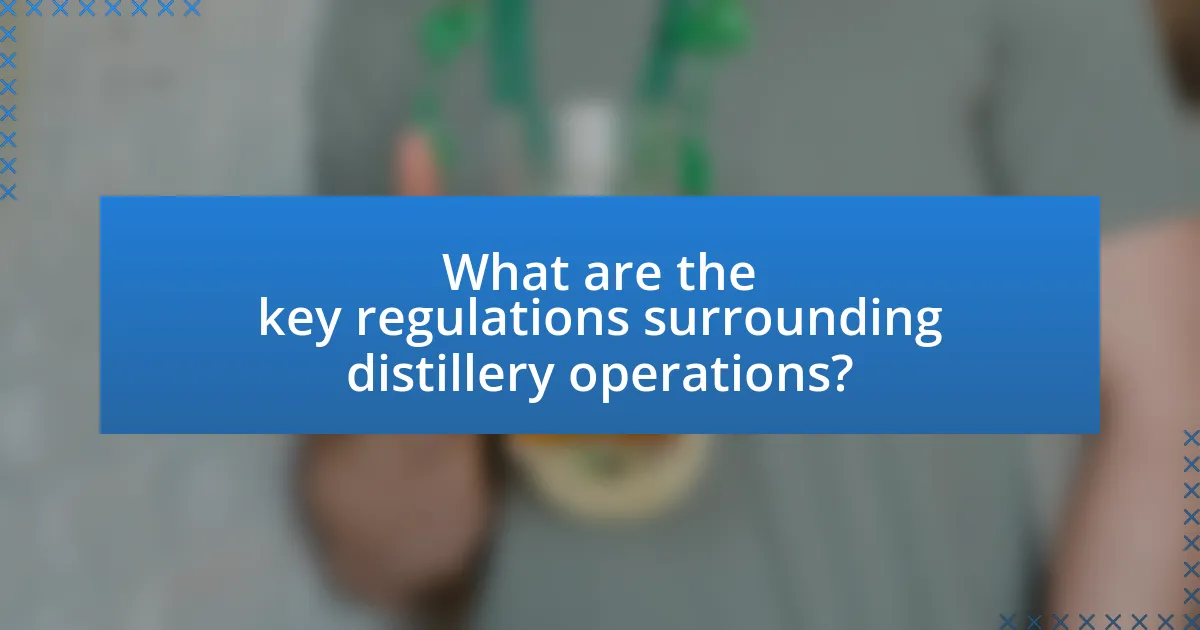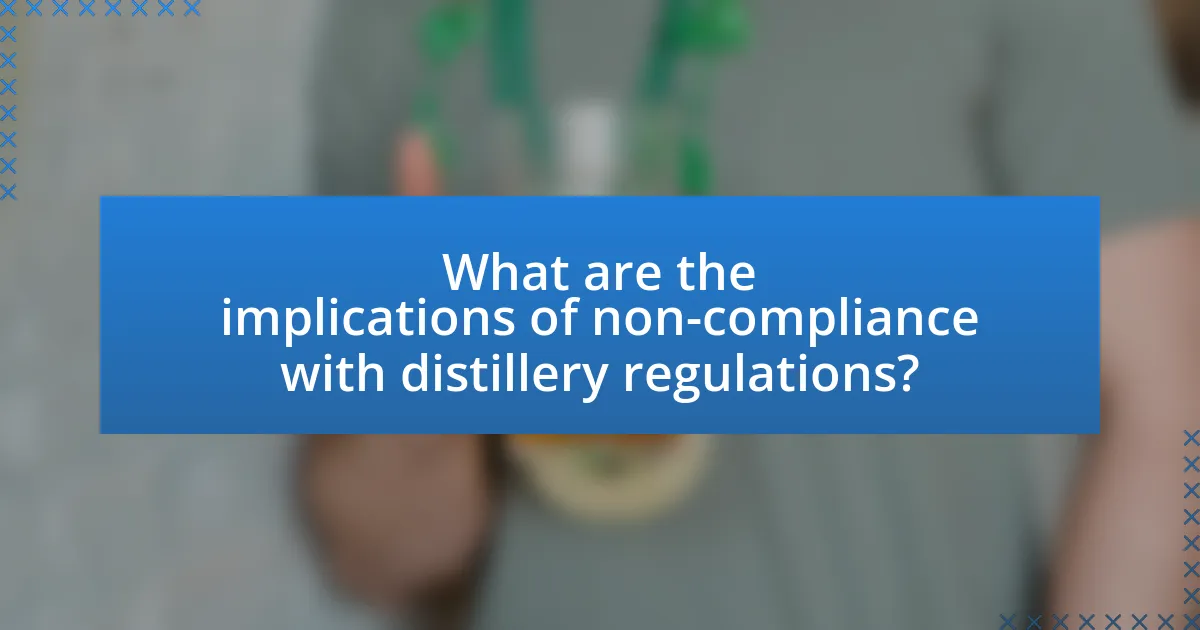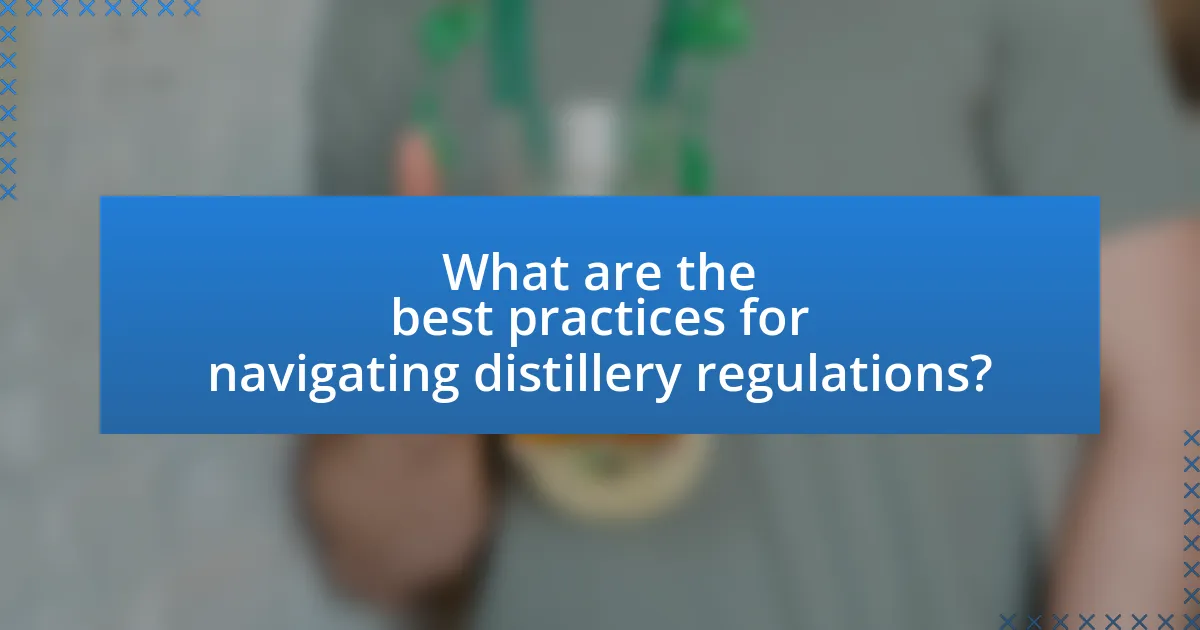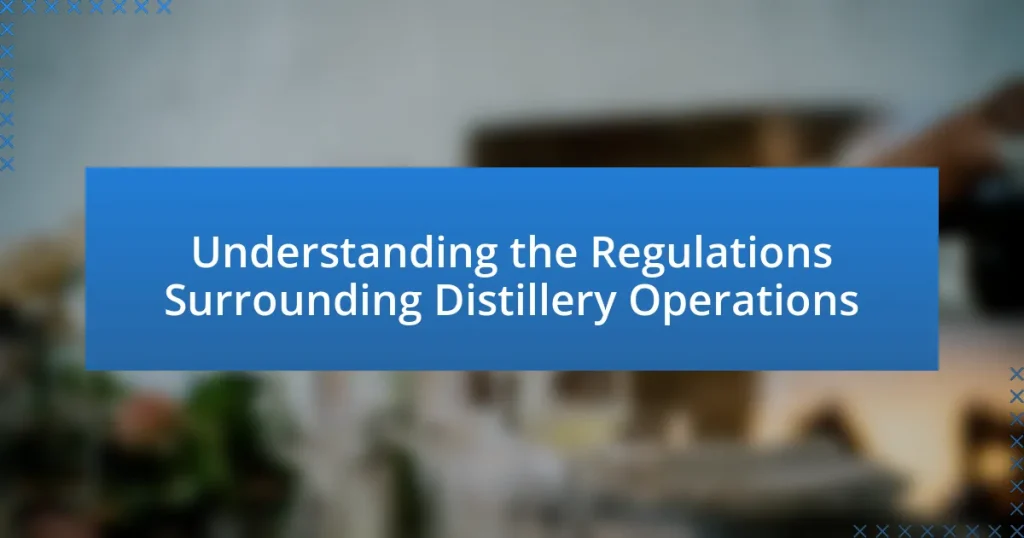The article focuses on the regulations surrounding distillery operations, detailing the federal, state, and local laws that govern the production, distribution, and sale of distilled spirits. It highlights the role of the Alcohol and Tobacco Tax and Trade Bureau (TTB) in enforcing federal regulations, including licensing, labeling, and taxation, as well as the varying state laws that dictate specific operational requirements. Additionally, the article discusses the implications of non-compliance, including potential penalties and the importance of maintaining health and safety standards. It emphasizes best practices for ensuring regulatory adherence and the challenges distilleries face in navigating the complex legal landscape.

What are the key regulations surrounding distillery operations?
The key regulations surrounding distillery operations include federal, state, and local laws that govern the production, distribution, and sale of distilled spirits. At the federal level, the Alcohol and Tobacco Tax and Trade Bureau (TTB) regulates distilleries, requiring them to obtain permits, adhere to labeling standards, and pay excise taxes on spirits produced. Additionally, the Food and Drug Administration (FDA) oversees health and safety regulations that may apply to distillery operations. State regulations vary widely, often involving licensing, zoning, and specific production requirements, which can include restrictions on hours of operation and sales. Local regulations may also impose additional requirements, such as health inspections and compliance with local ordinances. These regulations ensure that distilleries operate legally and safely while maintaining quality standards in the production of alcoholic beverages.
How do federal regulations impact distillery operations?
Federal regulations significantly impact distillery operations by establishing strict guidelines for production, labeling, and distribution of alcoholic beverages. These regulations, enforced by agencies such as the Alcohol and Tobacco Tax and Trade Bureau (TTB), require distilleries to obtain permits, adhere to specific production methods, and comply with safety standards. For instance, the TTB mandates that distilleries maintain accurate records of production and sales, which ensures transparency and accountability in the industry. Additionally, federal regulations dictate the taxation of spirits, influencing pricing and profitability for distillers. Compliance with these regulations is essential for legal operation and market access, as violations can result in fines or closure.
What specific federal laws govern distillery licensing?
The specific federal laws that govern distillery licensing are primarily outlined in the Federal Alcohol Administration Act (FAA Act) and the Internal Revenue Code (IRC). The FAA Act regulates the production, distribution, and labeling of alcoholic beverages, while the IRC establishes the tax obligations and licensing requirements for distilleries. Under these laws, distilleries must obtain a distilled spirits plant (DSP) permit from the Alcohol and Tobacco Tax and Trade Bureau (TTB) to legally produce spirits. Compliance with these regulations is essential for legal operation and taxation of distillery activities.
How do federal tax regulations affect distillery profitability?
Federal tax regulations significantly impact distillery profitability by imposing excise taxes on alcohol production, which can reduce net income. For example, the federal excise tax for distilled spirits is $13.50 per proof gallon for the first 100,000 gallons produced, which directly affects the cost structure of distilleries. Additionally, changes in tax policy, such as the Tax Cuts and Jobs Act of 2017, temporarily reduced these rates, allowing distilleries to retain more earnings and reinvest in their operations. Therefore, the structure and rate of federal taxes play a crucial role in determining the financial viability and growth potential of distilleries.
What state regulations must distilleries comply with?
Distilleries must comply with state regulations that govern licensing, production limits, labeling, and distribution. Each state has specific laws that dictate the number of permits required, the types of spirits that can be produced, and the maximum production volumes allowed. For example, states like California and Texas have distinct licensing processes that include both state and local approvals, while states such as New York impose strict labeling requirements to ensure consumer transparency. Additionally, many states enforce regulations regarding the sale and distribution of spirits, including restrictions on direct-to-consumer sales and requirements for reporting production and sales data to state authorities.
How do state laws vary regarding distillery operations?
State laws regarding distillery operations vary significantly across the United States, with each state establishing its own regulations concerning licensing, production limits, distribution, and sales. For example, some states, like Kentucky, have a long history of bourbon production and offer favorable regulations that support distillery operations, including lower taxes and streamlined licensing processes. In contrast, states such as Utah impose stricter controls on alcohol production and sales, requiring distilleries to adhere to more complex regulations. Additionally, states like California allow for greater flexibility in craft distilling, promoting small-scale operations with fewer restrictions. These variations reflect the diverse approaches to alcohol regulation, influenced by historical, cultural, and economic factors within each state.
What are the common state licensing requirements for distilleries?
Common state licensing requirements for distilleries typically include obtaining a federal distilled spirits plant permit, state alcohol manufacturing licenses, and local business permits. Distilleries must apply for a federal permit through the Alcohol and Tobacco Tax and Trade Bureau (TTB), which ensures compliance with federal regulations. Additionally, each state has its own specific licensing process, often requiring background checks, zoning approvals, and adherence to health and safety regulations. For example, California mandates a Type 74 license for distilled spirits manufacturers, while Texas requires a Distiller’s Permit. These requirements ensure that distilleries operate legally and responsibly within their jurisdictions.
What local regulations should distilleries be aware of?
Distilleries must be aware of local regulations regarding licensing, zoning, health and safety standards, and taxation. Licensing regulations typically require distilleries to obtain federal, state, and local permits to legally produce and sell alcoholic beverages. Zoning laws dictate where distilleries can operate, often requiring compliance with specific land-use regulations. Health and safety standards mandate adherence to sanitation and safety protocols to ensure consumer safety and employee welfare. Additionally, distilleries are subject to local and state taxes on production and sales, which can vary significantly by jurisdiction. Compliance with these regulations is essential for legal operation and to avoid penalties.
How do zoning laws impact the establishment of a distillery?
Zoning laws significantly impact the establishment of a distillery by dictating where such businesses can operate based on land use classifications. These laws can restrict distilleries to specific zones, such as industrial or commercial areas, and may impose conditions related to proximity to residential areas, which can affect operational feasibility. For instance, many municipalities require distilleries to be located away from schools and churches to minimize potential disturbances, thereby influencing site selection and development costs. Additionally, zoning regulations may require special permits or licenses, adding layers of complexity to the establishment process.
What health and safety regulations must distilleries follow?
Distilleries must adhere to several health and safety regulations, including those set forth by the Occupational Safety and Health Administration (OSHA) and the Alcohol and Tobacco Tax and Trade Bureau (TTB). OSHA regulations require distilleries to maintain a safe working environment, which includes proper handling of hazardous materials, ensuring adequate ventilation, and implementing safety training programs for employees. The TTB mandates compliance with regulations regarding the production, labeling, and storage of alcoholic beverages, which includes maintaining sanitary conditions and preventing contamination. These regulations are crucial for protecting workers and consumers, as they help mitigate risks associated with chemical exposure, fire hazards, and product safety.

What are the implications of non-compliance with distillery regulations?
Non-compliance with distillery regulations can lead to severe legal and financial repercussions for the distillery. Regulatory bodies, such as the Alcohol and Tobacco Tax and Trade Bureau (TTB) in the United States, impose fines, license suspensions, or revocations for violations. For instance, a distillery found operating without the necessary permits may face penalties exceeding thousands of dollars, as well as potential criminal charges against responsible individuals. Additionally, non-compliance can damage a distillery’s reputation, resulting in loss of consumer trust and decreased sales. Historical cases, such as the 2018 closure of a distillery in California due to failure to adhere to safety regulations, illustrate the tangible consequences of ignoring compliance requirements.
What penalties can distilleries face for regulatory violations?
Distilleries can face penalties such as fines, license suspension, or revocation for regulatory violations. Regulatory bodies, including the Alcohol and Tobacco Tax and Trade Bureau (TTB) and state authorities, enforce compliance with laws governing production, labeling, and distribution. For instance, violations can result in fines that may reach thousands of dollars per incident, and repeated offenses can lead to the loss of operational licenses, effectively halting business activities.
How do fines and sanctions affect a distillery’s operations?
Fines and sanctions significantly impact a distillery’s operations by imposing financial burdens and operational restrictions. When a distillery faces fines, it must allocate funds to cover these penalties, which can divert resources away from production, marketing, and innovation. For instance, a distillery fined for regulatory non-compliance may experience reduced cash flow, affecting its ability to invest in quality control or expand its product line. Additionally, sanctions can lead to operational changes, such as increased scrutiny from regulatory bodies, which may require the distillery to implement more stringent compliance measures. This can result in higher operational costs and potential delays in production. Historical data shows that distilleries facing repeated fines often struggle to maintain market competitiveness due to these financial and operational constraints.
What are the long-term consequences of losing a distillery license?
Losing a distillery license results in the permanent cessation of legal operations for the distillery. This consequence leads to significant financial losses, including the inability to produce and sell alcoholic beverages, which can result in bankruptcy or closure of the business. Additionally, the loss of a license can damage the distillery’s reputation, making it difficult to regain trust from consumers and partners in the industry. Historical data shows that distilleries that lose their licenses often struggle to re-enter the market due to stringent regulatory requirements and the competitive nature of the industry.
How can distilleries ensure compliance with regulations?
Distilleries can ensure compliance with regulations by implementing robust quality management systems and regularly conducting internal audits. These systems help in adhering to federal, state, and local laws governing production, labeling, and distribution of alcoholic beverages. For instance, the Alcohol and Tobacco Tax and Trade Bureau (TTB) mandates specific record-keeping and reporting requirements that distilleries must follow to avoid penalties. Additionally, staying informed about changes in legislation and participating in industry associations can provide distilleries with resources and guidance to maintain compliance.
What best practices should distilleries implement for regulatory adherence?
Distilleries should implement comprehensive compliance programs to ensure regulatory adherence. These programs must include regular training for employees on federal, state, and local regulations, as well as maintaining accurate records of production, inventory, and sales. Additionally, distilleries should conduct routine audits to identify and rectify any compliance gaps. For instance, the Alcohol and Tobacco Tax and Trade Bureau (TTB) mandates that distilleries keep detailed records of all operations, which can be verified through inspections. By adhering to these practices, distilleries can minimize the risk of violations and penalties, ensuring smooth operations within the regulatory framework.
How can distilleries stay updated on changing regulations?
Distilleries can stay updated on changing regulations by actively engaging with industry associations and regulatory bodies. These organizations often provide timely updates, resources, and training on compliance requirements. For example, the Distilled Spirits Council of the United States regularly disseminates information regarding federal and state regulations affecting distilleries. Additionally, subscribing to newsletters from government agencies, attending industry conferences, and participating in webinars can further enhance a distillery’s awareness of regulatory changes. This proactive approach ensures that distilleries remain compliant and informed about the evolving legal landscape.

What are the best practices for navigating distillery regulations?
The best practices for navigating distillery regulations include thorough research of federal, state, and local laws, maintaining accurate records, and ensuring compliance with licensing requirements. Distillers should familiarize themselves with the Alcohol and Tobacco Tax and Trade Bureau (TTB) regulations, as well as state-specific laws that govern production, distribution, and sales. Accurate record-keeping is essential for tracking production volumes, ingredient sourcing, and sales, which helps in audits and compliance checks. Additionally, obtaining the necessary permits and licenses before commencing operations is crucial, as operating without them can lead to significant legal penalties. Regularly consulting with legal experts in alcohol law can further ensure adherence to evolving regulations.
How can distilleries effectively manage their compliance processes?
Distilleries can effectively manage their compliance processes by implementing a robust compliance management system that includes regular audits, employee training, and the use of technology for tracking regulatory changes. A compliance management system ensures that all operational practices align with federal, state, and local regulations, which is crucial given the complex legal landscape governing distillery operations. Regular audits help identify gaps in compliance and allow for timely corrective actions, while employee training ensures that staff are aware of and adhere to compliance requirements. Additionally, utilizing software solutions can streamline the monitoring of regulatory updates, enabling distilleries to adapt quickly to changes in laws and regulations. This approach not only minimizes the risk of non-compliance but also enhances operational efficiency and fosters a culture of accountability within the organization.
What tools and resources are available for regulatory compliance?
Regulatory compliance in distillery operations can be supported by various tools and resources, including compliance management software, regulatory databases, and industry-specific guidelines. Compliance management software, such as MasterControl or Comply365, helps organizations track regulatory requirements and manage documentation efficiently. Regulatory databases, like the Alcohol and Tobacco Tax and Trade Bureau (TTB) database, provide up-to-date information on federal regulations. Additionally, industry-specific guidelines from organizations like the Distilled Spirits Council offer best practices and compliance checklists tailored to distillery operations. These resources collectively ensure that distilleries adhere to legal standards and maintain operational integrity.
How can distilleries train staff on compliance issues?
Distilleries can train staff on compliance issues through structured training programs that include regulatory education, hands-on workshops, and regular assessments. These programs should cover federal, state, and local regulations relevant to distillery operations, such as the Alcohol and Tobacco Tax and Trade Bureau (TTB) guidelines. Incorporating real-life scenarios and case studies can enhance understanding and retention of compliance requirements. Regular updates and refresher courses are essential to keep staff informed about changes in regulations, ensuring ongoing compliance and reducing the risk of violations.
What common challenges do distilleries face regarding regulations?
Distilleries commonly face challenges such as compliance with complex federal, state, and local regulations. These regulations often include licensing requirements, tax obligations, and health and safety standards that can vary significantly across jurisdictions. For instance, the Alcohol and Tobacco Tax and Trade Bureau (TTB) mandates strict adherence to labeling and advertising laws, which can complicate marketing efforts. Additionally, distilleries must navigate zoning laws that may restrict where they can operate, impacting their ability to expand or even establish a facility. The intricate nature of these regulations often requires distilleries to invest in legal expertise to ensure compliance, which can strain financial resources.
How can distilleries overcome regulatory hurdles?
Distilleries can overcome regulatory hurdles by actively engaging with regulatory bodies and ensuring compliance with local, state, and federal laws. This proactive approach includes understanding the specific regulations that apply to their operations, such as licensing requirements, health and safety standards, and labeling laws. For instance, the Alcohol and Tobacco Tax and Trade Bureau (TTB) in the United States mandates that distilleries adhere to strict guidelines regarding production and distribution, which can be navigated effectively through thorough research and consultation with legal experts. By establishing clear communication channels with regulators and participating in industry associations, distilleries can stay informed about changes in legislation and best practices, thereby minimizing the risk of non-compliance and facilitating smoother operational processes.
What role does industry advocacy play in shaping distillery regulations?
Industry advocacy plays a crucial role in shaping distillery regulations by influencing policymakers and regulatory bodies to create favorable legal frameworks. Advocacy groups, such as the Distilled Spirits Council of the United States, actively engage in lobbying efforts to represent the interests of distillers, promoting regulations that support industry growth and sustainability. For instance, these organizations often provide data and research to demonstrate the economic impact of distilleries, which can lead to more favorable tax policies and reduced regulatory burdens. Additionally, industry advocacy helps to educate lawmakers about the unique challenges faced by distillers, ensuring that regulations are practical and conducive to innovation within the sector.
What practical tips can help distilleries succeed in a regulated environment?
Distilleries can succeed in a regulated environment by implementing strict compliance protocols and maintaining transparent communication with regulatory bodies. Establishing a comprehensive understanding of local, state, and federal regulations is essential, as it allows distilleries to navigate legal requirements effectively. For instance, adhering to the Alcohol and Tobacco Tax and Trade Bureau (TTB) guidelines ensures that distilleries meet necessary standards for production, labeling, and distribution. Regular training for staff on compliance issues further enhances operational integrity and reduces the risk of violations. Additionally, investing in quality control measures helps maintain product consistency and safety, which is crucial for meeting regulatory standards. By prioritizing compliance and quality, distilleries can build a reputable brand and foster trust with consumers and regulators alike.


